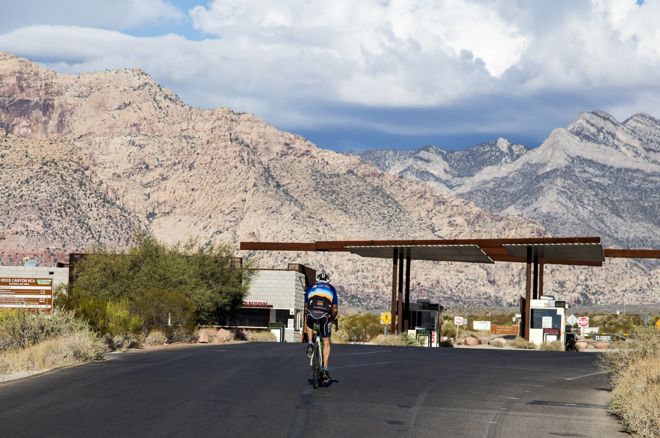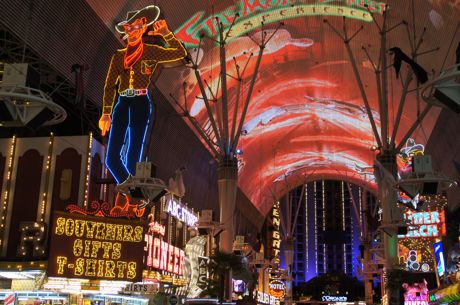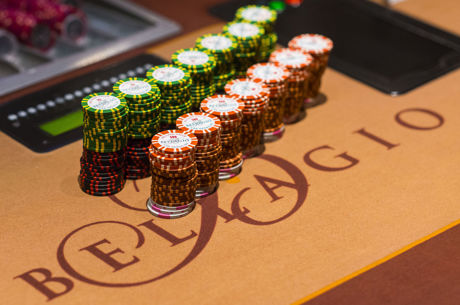How to Stay Healthy in Las Vegas

There is so much to do during the World Series of Poker, it's not hard to forget about staying in shape and being healthy. At the same time, optimal poker play �� especially during long tournaments �� depends a lot on being at your best physically.
Even more important, without at least a reasonable amount of attention to your health, you can suffer medical problems during your stay. Believe me, from personal experience of severe dehydration and fatigue in the emergency room at Las Vegas's Sunrise Hospital & Medical Center, that's a real inconvenience.
When you go out for the WSOP this summer, save yourself a lot of expense, inconvenience and risk to your health and remain mindful of your physical well being. Here are five guidelines for staying healthy during your trip out to Las Vegas.
1. Drink lots of water
Dehydration is the most serious risk to your health while in the desert environment of Las Vegas. It sneaks up on you. Even without any serious exertion, the low humidity will suck water right out of your system, even without obvious heat or sweating. Before you know it, your body is dehydrated, lowering your immune system and diminishing your body's ability to function correctly.
Prevent dehydration by regularly drinking lots of water. Do this even though you may not be thirsty. I find it helpful to buy a case of water bottles when I arrive, keeping some in my car, some in my room and some in a shoulder bag or backpack that I always have with me. I habitually drink water during whatever I'm doing �� walking, playing poker, watching a show, driving... everything.
When I run low on water bottles I buy another case. If you're concerned about the environment you can buy a gallon jug instead of lots of bottles, refilling the bottles when they are emptied. The important thing is to drink water regularly.
Similarly, you need to avoid caffeinated beverages and alcohol as much as possible. Alcohol and caffeine both dehydrate you, which means if you do indulge, you need all the more water to compensate.
2. Eat right
Easy to say, I know. But there are just so many opportunities to eat wrong in Las Vegas. The city is littered with fast food places, making it so simple to stay filled up on fat, salt, sugar and alcohol.
I'm not suggesting you become a vegan. But keep an eye on eating some fresh fruit and vegetables. I find it useful to go to a supermarket and buy oranges, bananas, unsalted nuts, dried fruit, and a bag or two of those "baby" carrots or other chopped up vegetables that are easy to snack on.
I bring these healthy snacks with me to the poker table, munching on them occasionally when I'm in a tournament or long cash game. I find that it keeps me from eating junk and even helps my focus and alertness so I'm not craving a Red Bull.
3. Protect yourself from the sun
You may be planning to spend most of your time indoors. But if you do venture outside you need to be concerned about the serious effect of the sun in Las Vegas. The sun is different in the desert. Even on a rare cloudy day, the sun can still burn, and it accelerates dehydration no matter your skin tone.
To avoid health problems, if you are going to spend anything more than five minutes out in the sun, make sure you wear sunblock. If you're hiking outside, even in the morning or late afternoon, wearing a baseball cap (or even better, a wide brimmed hat) is essential.
4. Exercise
The hotels and casinos in Las Vegas have some of the nicest gyms and most beautiful pools in the world. Exercise has been shown to improve mental functions. I suggest planning at least an hour of exercise every day.
Not into gyms or pools? Go for a walk. You can get a good workout just by walking for 30 minutes in one direction and then heading home. Stuck in a multi-storied casino-hotel? Walk up the stairs a few flights to put some extra exertion into your walk. Avoid stopping along the way, as it's the consistent brisk pace that will get your heart rate up and give it the workout it craves after you've been inert all day.
There are also some beautiful trails in and around the Las Vegas area such as the ones at Red Rock Canyon and Mt. Charleston, to name just two. You can go for a hike �� I recommend the early morning or late afternoon to avoid the worst of the heat and direct sunlight �� or even rent a bike and go for a ride.
5. Sleep
It's easy to find a reason not to retire for the evening in a city that never closes. There always seems to be a great game going somewhere. And when you're tired of poker, there's always a restaurant, bar or club available for debriefing, celebrating or drowning your sorrows.
Yes, we all know Mom's advice to get a solid eight hours each night. But what's an obsessive poker player to do when he is stuck and steaming at 3:00 a.m.? (And the game is filled with fish!)
While getting a solid eight hours might be ideal, I've found that the hours of sleep need not be consecutive to be effective. When I've either had or expect to have a long night of poker, naps during the day seem to help me stay alert and healthy.
So that's what I recommend. If your playing schedule prevents you from getting all of the rest you need in one long stretch, try and grab the rest when you can, taking some naps during the day when the poker action and temptation to play might not be as great.
Great poker minds like ours that can quickly compute implied pot odds in a multi-way hand should be able to figure out that 2 + 2 + 3 + 1 = 8.
Conclusion
You don't have to become a fitness guru to stay healthy during the WSOP. But you can follow these five basic guidelines to stay out of trouble.
Photo courtesy of BLM Nevada/Flickr
Ashley Adams has been playing poker for 50 years and writing about it since 2000. He is the author of hundreds of articles and two books, Winning 7-Card Stud (Kensington 2003) and Winning No-Limit Hold'em (Lighthouse 2012). He is also the host of poker radio show House of Cards. See www.houseofcardsradio.com for broadcast times, stations, and podcasts.








